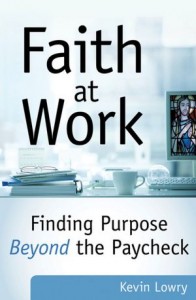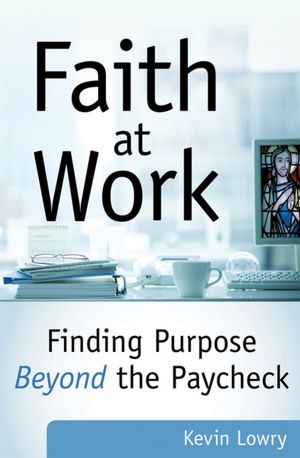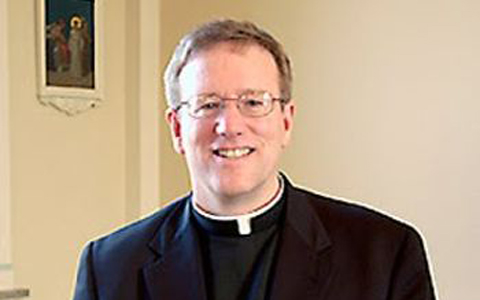 We may often wonder if authors actually live up to the standards they outline for us in their books. In the case of Kevin Lowry and Faith at Work: Finding Purpose Beyond the Paycheck (Our Sunday Visitor, 2011), there is no doubt that he lives up to the important themes of this wonderful book. Kevin and his wife Kathi are happily married converts to the Church with eight children. After a successful twenty year secular career in executive leadership roles, Kevin joined The Coming Home Network International as chief operating officer. His passion for our Catholic faith, devotion to his family and focus on serving others is obvious to anyone who knows him.
We may often wonder if authors actually live up to the standards they outline for us in their books. In the case of Kevin Lowry and Faith at Work: Finding Purpose Beyond the Paycheck (Our Sunday Visitor, 2011), there is no doubt that he lives up to the important themes of this wonderful book. Kevin and his wife Kathi are happily married converts to the Church with eight children. After a successful twenty year secular career in executive leadership roles, Kevin joined The Coming Home Network International as chief operating officer. His passion for our Catholic faith, devotion to his family and focus on serving others is obvious to anyone who knows him.
In Faith at Work, Kevin writes from his heart and through the candid sharing of his faith journey, numerous workplace experiences and Church teaching helps us understand the vital importance of living out our faith at work. As he reminds us, we are called to lead lives of holiness and that life necessarily involves our work. In an age when many may shy away from being authentically Catholic in the public square, Kevin provides the road map and necessary tools to make this challenge a reality.
I recently had an opportunity to speak with Kevin about his new book.
Kevin, what led you to write Faith at Work: Finding Purpose Beyond the Paycheck?
I wanted to encourage people – there’s a real opportunity to grow in our faith, and to become more effective in our jobs simultaneously. But this requires a shift in perspective. The secular culture has caricatured Christianity in general and Catholicism in particular, and often views people of faith with a sense of suspicion. Are we just waiting for a chance to proselytize? Of course, nothing could be further from the truth. Our faith is not manipulative, and the most effective means of evangelization is for each one of us to learn the faith – and live it. That means doing our absolute best at work, taking a sincere interest in others, forgiving others… and by doing so, we really do find purpose that goes well beyond a paycheck.
This book works well on many levels and for a wide and varied audience in my view. Did you have a specific group in mind when you wrote it?
Well, thanks Randy! It’s interesting, my model was Jesus Himself, who used stories anyone could relate to as a means of illustrating his points. So that’s what I attempted to do. I hope anyone with a job will benefit from reading the book, and recommend it to co-workers, family and friends.
There are CEOs of large organizations who have given me great feedback, and just this morning I received one of the best compliments to date. My barber (a non-Catholic) said he was really enjoying it, because in his words, it’s “relatable.”
With the action steps and questions for reflection at the end of each chapter, I also hope it works well in group settings – with students or small study groups, for example.
I love the transparent writing style you have in this book. Do you think it is important to be so revealing of yourself when writing this kind of book?
Most of the enduring lessons I have learned over the years were due to my own mistakes. They provided plenty of material for the book! I’m too cognizant of my own shortcomings to write in any other manner. Yet I’m convinced that it’s precisely the challenges we face every day – even when they’re caused by our own stupidity – that can lead us closer to Christ. I’ve seen it time and time again. So the answer to your question is yes. The Holy Spirit can use all of us as instruments for God’s glory – even when we’re a little obtuse. I speak from experience!
As you and I have discussed in the past, faith in the workplace is almost like “mission territory” for the Church. Why do you think Catholics are so receptive to this message today?
I completely agree! I’m so happy that Catholics are becoming ever more receptive to this message, and that there is more being written on the subject including your terrific book, The Catholic Briefcase: Tools for Integrating Faith and Work.
In many ways, the workplace is the front line of the new evangelization, since so many people have a jaded or misguided view of Christians. By living as authentic witnesses, and demonstrating how growth in faith and work are mutually reinforcing, we can offer hope to so many people who genuinely need it.
When I was in the corporate world, one of the things that made a big impression on people was the fact that my wife Kathi and I have eight kids. Most people thought we were nuts, of course, but it demonstrated that our priorities went beyond just a paycheck.
Witnessing at work is first and foremost about striving for holiness, and Catholics are increasingly aware of our need to do this all the time. Part-time Christianity just doesn’t get the job done, so to speak. God asks more of us than that.
One of the chapters that really stuck with me was Chapter 10: Call in the Consultants. Why is it so important for us to have guides, mentors and spiritual direction?
Yes, this was an important lesson for me as well. Particularly as we examine our own lives, it’s impossible to be objective. Being open to input from others is a gift, and has amazing practical implications. One of the stories in the chapter talks about a woman who loses her job, and the incredible impact a friend’s guidance has on the situation. What continues to astonish me is how these works of grace occur through completely normal, day-to-day interactions. A word of encouragement. A phone call at the right time. You just never know how God will use everyday events to bring about incredible things.
I came up through the ranks in a CPA firm, where evaluations were routinely given and received. Over the course of time I came to recognize the value of impartial input to career growth. After becoming Catholic, and experiencing spiritual direction, I became a huge fan of this type of guidance. The key, in both cases, is finding people who are willing to speak the truth charitably. Some of the most important lessons I’ve learned have also been some of the hardest.
You have woven solid Catholic teaching into every chapter of your book. Can you share with our readers the importance of knowing our faith as it relates to living their faith at work?
Yes, there is no substitute for knowing our faith. One of the things I love about being Catholic is the fact that it’s based on truth (in the person of Christ) and natural law; whether doctrine corresponds to the latest polling data is utterly irrelevant. Although this causes a natural tension between what we recognize as truth and our collective failure to live it fully, it also provides us with an “eternal perspective” that is extremely helpful.
We are the recipients of an incredible legacy – we have scripture, the Catechism, writings of the popes and the saints, and so much of it is directly relevant to our work. St. Josemaria Escriva, founder of Opus Dei, is just one example – his writings are so profound, and yet so practical. There are also countless great contemporary writers and thinkers – never before have so many terrific resources been so widely available. It’s a cornucopia of inspiration! As we spend time praying and contemplating the richness of our heritage, it’s almost inevitable that we’ll desire to put what we learn into action, and what better place than the workplace?
Can you describe for us what you hope each reader gets from your book? What would the “day after” completing the book look like for them?
Yes, absolutely.
I had a boss who once told me that he didn’t remember anything tangible from his MBA program, what mattered was that he learned what he called a “way of thinking” that was valuable. In much the same way, I hope each reader looks at his or her work just a little bit differently after reading the book. I would love to see people embrace their faith fully at work, expand their sense of mission, view challenges as opportunities, see conflicts as an invitation for us to take an interest in others… ultimately, to see work as part of our divine calling.
If readers are able to (as my barber says) find the stories relatable to their own experience, I hope the day after they read the book, they try to put just one principle into practice. They’ll recognize which one. Every single interaction, problem, celebration – in short, ever workday – is an opportunity.
Kevin, do you have any other book projects in the works? What’s next for you on the writing front?
I have been writing a few articles for my blog (http://gratefulconvert.com/) and various other venues including ICL – what a privilege! I’m also discerning another book project, and praying that Faith at Work is well received. As you know, Randy, writing is time-consuming, but it’s a profound honor to do the Lord’s work! Thank you for sharing in that mission, my friend!
Kevin’s new book is readily available through Amazon, OSV and your local Catholic bookstore. I encourage you to pick up your copy today!
Randy Hain, Senior Editor for The Integrated Catholic Life™, is the author of The Catholic Briefcase: Tools for Integrating Faith and Work which was recently released by Liguori Publications. ”The Catholic Briefcase” is available on Amazon, Barnes & Noble online and your local Catholic bookstore.
Please help us in our mission to assist readers to integrate their Catholic faith, family and work. Tell your family and friends about this article using both the Share and Recommend buttons below and via email. We value your comments and encourage you to leave your thoughts below. Thank you! – The Editors













